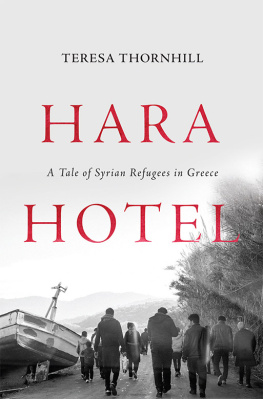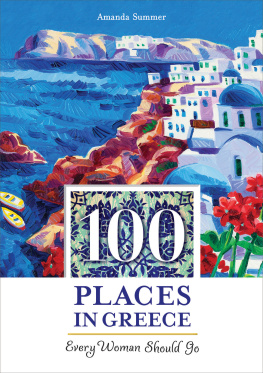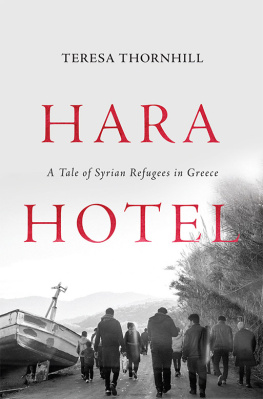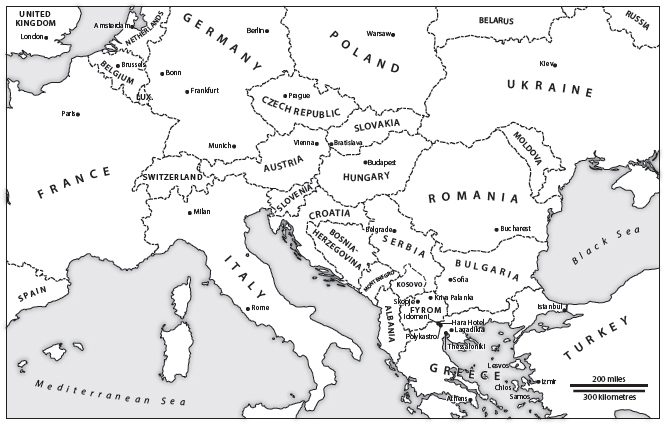Names: Thornhill, Teresa, author.
Title: Hara Hotel : a tale of Syrian refugees in Greece / Teresa Thornhill.
Description: London ; Brooklyn, NY : Verso, 2018. | Includes index.
Subjects: LCSH: Refugees Syria. | Syrians Greece Social conditions. | Refugee camps Greece. | Greece Emigration and immigration Social aspects. | Syria Emigration and immigration.
Introduction: A Man Wades out
of the Sea, January 2016
I walk into my kitchen and stop in front of the TV in time to glimpse a big hairy man in shorts wading out of the sea towards a beach. An advert, I think, for a Caribbean holiday, and Im about to turn away, but something in the way the man is forcing his legs through the shallow water holds my attention. Then it dawns on me that the man is not returning from a pleasant swim: the scene is Lesvos and the man a refugee.
Grabbing the remote and turning up the volume, I catch the voice of the reporter: thirty-four people in the dinghy when it capsized, and just one made it to the shore.
The man staggers, dragging his legs, his eyes fixed on a small group of people who stand waiting on the beach. As he reaches them, one steps forward with a large stripy towel and wraps it around him. The gesture is tender, made without hesitation, like that of a parent meeting a child at the end of a swimming lesson. Seconds later, the man crumples onto the shingle, too exhausted to stand.
For the next two days, the big man and his narrow escape from death refuse to leave my thoughts. Whether Im driving, working, hanging out with my teenage son or walking in the woods, my mind replays the sight of him emerging from the sea. Who is he, this sole survivor? Channel Four didnt give any details.
I imagine hes Syrian; and a man of means, judging by his well-covered frame. I push myself to imagine what it would be like to abandon the country where youve spent your entire life, cross a small stretch of water to a new continent, and at the same time lose everyone you love. Two questions plague me: What is the man feeling now? And, if the sea has swallowed his wife and children, how does he go on? Does he pick himself up, hitch a ride to the registration point and take a ferry to Athens? I picture him sitting on the beach staring at the waves, unable to go forwards or back. The scale of the psychological shock is beyond imagining.
But perhaps the man was travelling by himself, a lone figure in an overloaded dinghy surrounded by strangers. If so, when the vessel hit trouble, he could simply strike out for the shore. He must have been a strong swimmer and his thickset frame would have given him resistance against the cold. Yet even if he was alone, many of his fellow passengers must have been his compatriots. How does he feel, waking the next morning in a tent on Lesvos, reliving the horror of their shouts as they disappeared into the sea?
Ten weeks later, in April 2016, I set off for Greece. Since the previous August, hundreds of European volunteers had travelled there to help the scores of thousands of refugees arriving on the islands. Theyd come from Norway, Sweden, Germany, Spain, the Czech Republic, Slovakia and many other countries, using Facebook to fundraise and to encourage others who couldnt join them to send material aid such as second-hand clothing, nappies and tents. On Lesvos, Chios, Samos and other islands theyd stationed themselves on the beaches throughout the winter, guiding the smugglers dinghies to the safest landing spots and helping the refugees ashore. Id been with them in spirit for many months, but it had taken time to free myself from the demands of work and family life. Now, at last, I was free to travel. It was the Easter holidays and my son was staying with his dad.
Id had my doubts, of course. Wasnt it for UNHCR and the big NGOs to receive the refugees? Could a bunch of untrained volunteers really contribute something useful, or might they do more harm than good? From the safety of England it was hard to be sure, but the blogs Id read suggested that the NGOs were hopelessly overstretched, and that much of the work done by volunteers was invaluable. On Lesvos, over the winter, it had fallen to volunteers to support distraught refugees whod lost relatives in the course of their journey and to provide them with dry clothes, baby food and sleeping bags. Families had been driven across the island by volunteers in hire cars, to a camp where they were fed and hosted until they were able to register with the Greek authorities.
Id had to think hard about what skills I could offer. My work as a family lawyer had given me endless experience of supporting people in distress, but it wasnt aid work. What I did have, however, was a working knowledge of Levantine Arabic. I wasnt bound for the islands, but for northern Greece, where Id arranged to work with a tiny Norwegian NGO called Northern Lights Aid (NLA). They were based at Hara Hotel, a small camp half a kilometre from the border with the Former Yugoslav Republic of Macedonia (otherwise known by the acronym FYROM).
As more and more refugees poured out of war-ravaged Syria, European governments were desperately looking for ways to stop them leaving the Middle East. On 9 March 2016, in response to border restrictions further north imposed by Austria and some of the Balkan states, FYROM had closed its border to refugees for an unspecified period of time. As a result, some 12,000 people were now marooned in makeshift camps at Idomeni on the Greek side of the border. Most were Syrians, but there were also Iraqis, Afghans, Iranians and Pakistanis. Like the big man on my TV screen, the vast majority had made the perilous sea crossing from Turkey to the Greek islands in inflatable dinghies supplied by smugglers. Greece had allowed them to land and shipped them to Athens on safe seagoing ferries, and from there theyd taken trains and buses to the border.
The refugees were united in the goal of reaching Germany, where they planned to claim asylum; but for the time being they were trapped. In late August 2015, Chancellor Angela Merkel had made a public commitment to receive Syrian refugees, regardless of whether they had passed through another safe country en route. Many Syrians had fled their country heading for Germany, however, long before this commitment was given.














